八年级英语下册《Unit 6 Enjoying Cycling》状语从句的用法综合习题演练(含解析)
- 格式:doc
- 大小:24.00 KB
- 文档页数:3
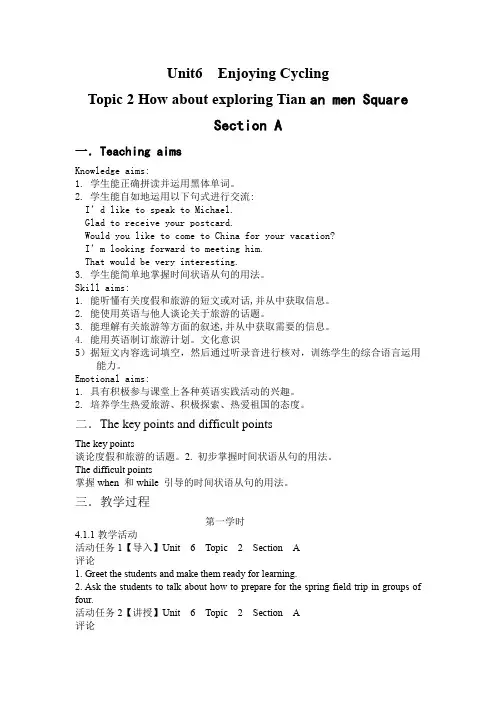
Unit6 Enjoying CyclingTopic 2 How about exploring Tian an men SquareSection A一.Teaching aimsKnowledge aims:1. 学生能正确拼读并运用黑体单词。
2. 学生能自如地运用以下句式进行交流:I’d like to speak to Michael.Glad to receive your postcard.Would you like to come to China for your vacation?I’m looking forward to meeting him.That would be very interesting.3. 学生能简单地掌握时间状语从句的用法。
Skill aims:1. 能听懂有关度假和旅游的短文或对话,并从中获取信息。
2. 能使用英语与他人谈论关于旅游的话题。
3. 能理解有关旅游等方面的叙述,并从中获取需要的信息。
4. 能用英语制订旅游计划。
文化意识5)据短文内容选词填空,然后通过听录音进行核对,训练学生的综合语言运用能力。
Emotional aims:1. 具有积极参与课堂上各种英语实践活动的兴趣。
2. 培养学生热爱旅游、积极探索、热爱祖国的态度。
二.The key points and difficult pointsThe key points谈论度假和旅游的话题。
2. 初步掌握时间状语从句的用法。
The difficult points掌握when 和while 引导的时间状语从句的用法。
三.教学过程第一学时4.1.1教学活动活动任务1【导入】Unit6Topic2Section A评论1. Greet the students and make them ready for learning.2. Ask the students to talk about how to prepare for the spring field trip in groups of four.活动任务2【讲授】Unit6Topic2Section A评论1. Ask the students to listen to the conversation about Diana and Lily’s coming holiday and choose the correct answers. Then check the answers. Finish 4.2. Ask the students to listen to 1a and tick the pictures according to what they hear. Then check the answers. Finish 1b.3. Ask the students to listen again and answer the following questions:1) Who is Darren?2) What was Darren doing while Michael was enjoying his trip?3) What did Michael invite Darren to do?4) What did Michael want Kangkang to do?4. Ask the students to read 1a and finish 1c.5. Play the flash of 1a and ask the students to follow.活动任务3【活动】Unit6Topic2Section A评论1. Let the students read 1a, and then ask them to learn in groups to find out the difficult points. At last let them sum up the main points of the conversation.2. Make a summary to explain the key points and difficult points to the students:(1) --I’d like to speak to Michael. –This is Michael speaking.(2) be busy doing /with sth.(3) (be) on vacation(4) prepare for=get ready for(5) look forward to doing sth.(6) How/What about doing sth?活动任务4【练习】Unit6Topic2Section A评论1. Ask the students to practice 1a in groups of three and act it out.2. Ask the students to read 1a and find out the sentences containing adverbial clauses of time .3. Ask the students to check their answers. Introduce and explain adverbial clauses of time briefly. Learn the use of “when” and “while”.4. Ask the students to look at the pictures of 3, and then make sentences with while or when. Let two students write down their answers on the blackboard. Check the answers.活动任务5【测试】Unit6Topic2Section A评论1. Ask the students to choose the words and use the proper forms to complete the sentences.receive camping before postcard vacationWe send each other _________ before the New Year comes. It’s better to give than to ________. In China, students usually have a two-month summer ________. You’d better plan the trip carefully ______ you start. What about going _______ in the forest next weekend?2. Fill in the blanks with when or while.1. He was listening to the radio ______ I knocked at the door.2. Sandy was reading the newspapers ______ her younger brother was watching TV.3. ____________ he was listening to music on the computer, the telephone rang.4. I like coffee, ______ my sister likes apple juice.活动任务6【作业】Unit6Topic2Section A评论Let the students to search the Internet to find out some information about Tian’anmen Square.反思:本课通过多个驱动式活动,来实现本课的教学目标,进而培养学生热爱旅游、积极探索、热爱祖国的态度。
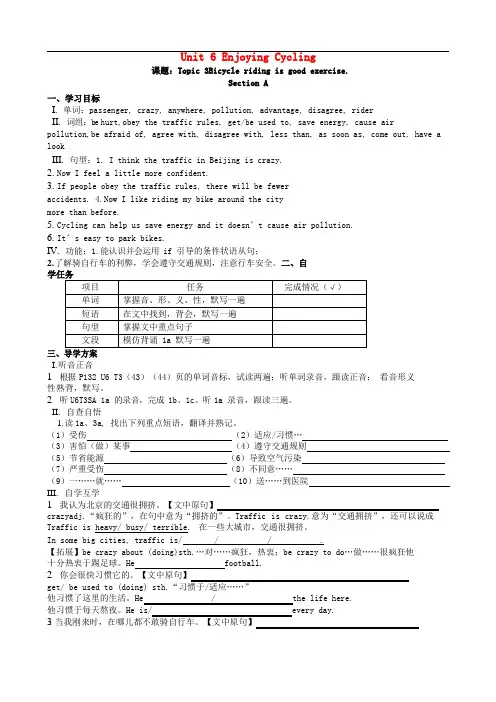
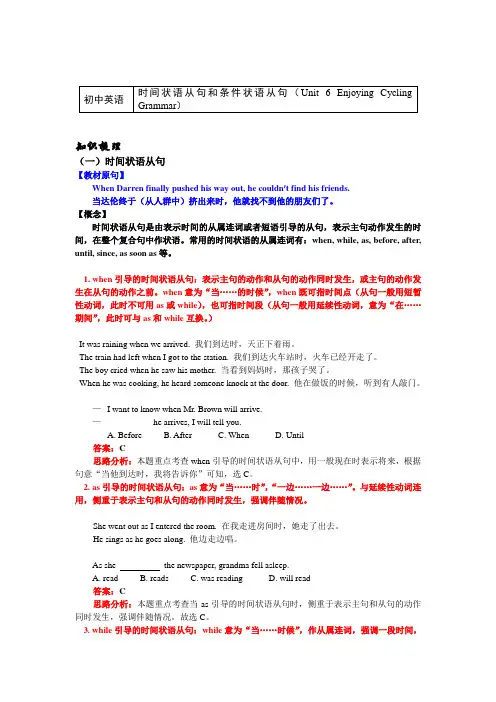
知识梳理(一)时间状语从句【教材原句】When Darren finally pushed his way out, he couldn’t find his friends.当达伦终于(从人群中)挤出来时,他就找不到他的朋友们了。
【概念】时间状语从句是由表示时间的从属连词或者短语引导的从句,表示主句动作发生的时间,在整个复合句中作状语。
常用的时间状语的从属连词有:when, while, as, before, after, until, since, as soon as等。
1. when引导的时间状语从句:表示主句的动作和从句的动作同时发生,或主句的动作发生在从句的动作之前。
when意为“当……的时候”,when既可指时间点(从句一般用短暂性动词,此时不可用as或while),也可指时间段(从句一般用延续性动词,意为“在……期间”,此时可与as和while互换。
)It was raining when we arrived. 我们到达时,天正下着雨。
The train had left when I got to the station. 我们到达火车站时,火车已经开走了。
The boy cried when he saw his mother. 当看到妈妈时,那孩子哭了。
When he was cooking, he heard someone knock at the door. 他在做饭的时候,听到有人敲门。
—I want to know when Mr. Brown will arrive.—__________ he arrives, I will tell you.A. BeforeB. AfterC. WhenD. Until答案:C思路分析:本题重点考查when引导的时间状语从句中,用一般现在时表示将来,根据句意“当他到达时,我将告诉你”可知,选C。
2. as引导的时间状语从句:as意为“当……时”,“一边……一边……”。
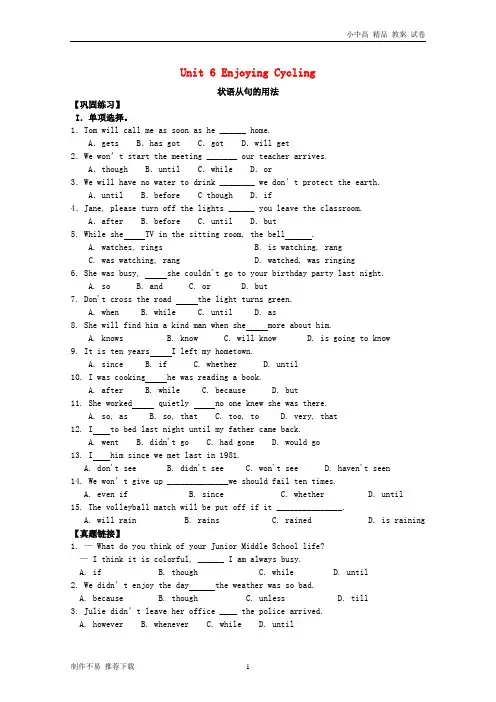
Unit 6 Enjoying Cycling状语从句的用法【巩固练习】I.单项选择。
1.Tom will call me as soon as he ______ home.A.gets B.has got C.got D.will get2.We won’t start the meeting _______ our teacher arrives.A.though B.until C.while D.or3.We will have no water to drink ________ we don’t protect the earth.A.until B.before C though D.if4.Jane, please turn off the lights ______ you leave the classroom.A.after B.before C.until D.but5. While she TV in the sitting room, the bell .A. watches, ringsB. is watching, rangC. was watching, rangD. watched, was ringing6. She was busy, she couldn't go to your birthday party last night.A. soB. andC. orD. but7. Don't cross the road the light turns green.A. whenB. whileC. untilD. as8. She will find him a kind man when she more about him.A. knowsB. knowC. will knowD. is going to know9. It is ten years I left my hometown.A. sinceB. ifC. whetherD. until10. I was cooking he was reading a book.A. afterB. whileC. becauseD. but11. She worked quietly no one knew she was there.A. so, asB. so, thatC. too, toD. very, that12. I to bed last night until my father came back.A. wentB. didn't goC. had goneD. would go13. I him since we met last in 1981.A. don't seeB. didn't seeC. won't seeD. haven't seen14. We won’t give up ______________we should fail ten times.A. even ifB. sinceC. whetherD. until15. The volleyball match will be put off if it _______________.A. will rainB. rainsC. rainedD. is raining 【真题链接】1. — What do you think of your Junior Middle School life?— I think it is colorful, ______ I am always busy.A. ifB. thoughC. whileD. until2. We didn’t enjoy the day the weather was so bad.A. becauseB. thoughC. unlessD. till3. Julie didn’t leave her office ____ the police arrived.A. howeverB. wheneverC. whileD. untilII.根据汉语提示,完成下列句子。
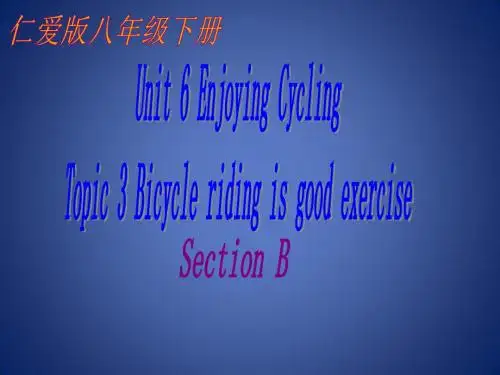
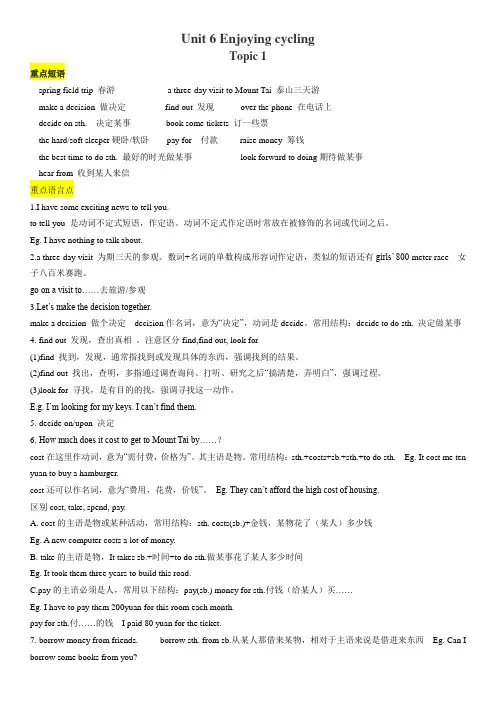
Unit 6 Enjoying cyclingTopic 1重点短语spring field trip 春游 a three-day visit to Mount Tai 泰山三天游make a decision 做决定find out 发现over the phone 在电话上decide on sth. 决定某事book some tickets 订一些票the hard/soft sleeper硬卧/软卧pay for 付款raise money 筹钱the best time to do sth. 最好的时光做某事look forward to doing期待做某事hear from 收到某人来信重点语言点1.I have some exciting news to tell you.to tell you 是动词不定式短语,作定语。
动词不定式作定语时常放在被修饰的名词或代词之后。
Eg. I have nothing to talk about.2.a three-day visit 为期三天的参观。
数词+名词的单数构成形容词作定语,类似的短语还有girls’ 800-meter race 女子八百米赛跑。
go on a visit to……去旅游/参观3.Let’s make the decision together.make a decision 做个决定decision作名词,意为“决定”,动词是decide。
常用结构:decide to do sth. 决定做某事4. find out 发现,查出真相。
注意区分find,find out, look for(1)find 找到,发现,通常指找到或发现具体的东西,强调找到的结果。
(2)find out 找出,查明,多指通过调查询问、打听、研究之后“搞清楚,弄明白”,强调过程。
(3)look for 寻找,是有目的的找,强调寻找这一动作。
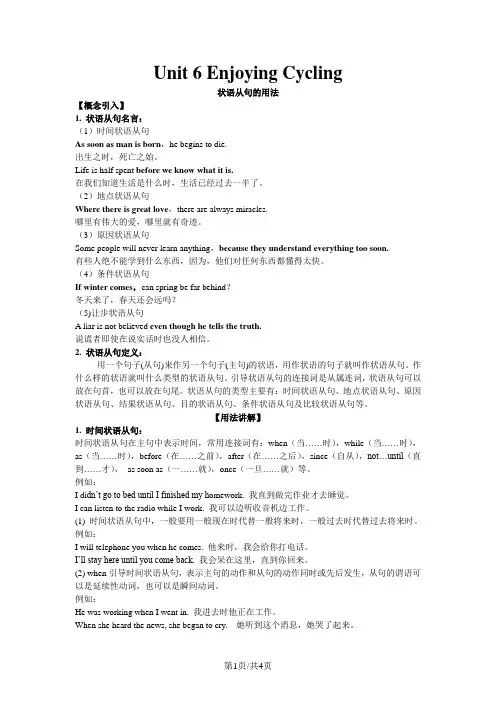
Unit 6 Enjoying Cycling状语从句的用法【概念引入】1. 状语从句名言:(1)时间状语从句As soon as man is born,he begins to die.出生之时,死亡之始。
Life is half spent before we know what it is.在我们知道生活是什么时,生活已经过去一半了。
(2)地点状语从句Where there is great love,there are always miracles.哪里有伟大的爱,哪里就有奇迹。
(3)原因状语从句Some people will never learn anything,because they understand everything too soon.有些人绝不能学到什么东西,因为,他们对任何东西都懂得太快。
(4)条件状语从句If winter comes,can spring be far behind?冬天来了,春天还会远吗?(5)让步状语从句A liar is not believed even though he tells the truth.说谎者即使在说实话时也没人相信。
2. 状语从句定义:用一个句子(从句)来作另一个句子(主句)的状语,用作状语的句子就叫作状语从句。
作什么样的状语就叫什么类型的状语从句。
引导状语从句的连接词是从属连词,状语从句可以放在句首,也可以放在句尾。
状语从句的类型主要有:时间状语从句、地点状语从句、原因状语从句、结果状语从句、目的状语从句、条件状语从句及比较状语从句等。
【用法讲解】1. 时间状语从句:时间状语从句在主句中表示时间,常用连接词有:when(当……时),while(当……时),as(当……时),before(在……之前),after(在……之后),since(自从),not…until(直到……才),as soon as(一……就),once(一旦……就)等。
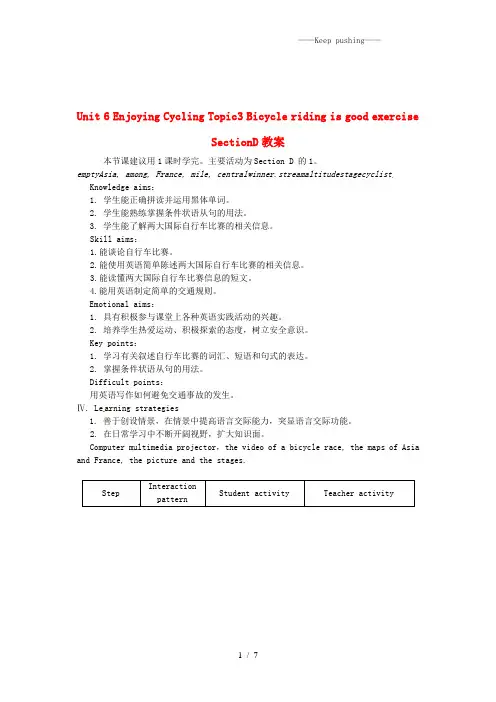
Unit 6 Enjoying Cycling Topic3 Bicycle riding is good exerciseSectionD教案本节课建议用1课时学完。
主要活动为Section D 的1。
emptyAsia, among, France, mile, centralwinner.streamaltitudestagecyclist Knowledge aims:1. 学生能正确拼读并运用黑体单词。
2. 学生能熟练掌握条件状语从句的用法。
3. 学生能了解两大国际自行车比赛的相关信息。
Skill aims:1.能谈论自行车比赛。
2.能使用英语简单陈述两大国际自行车比赛的相关信息。
3.能读懂两大国际自行车比赛信息的短文。
4.能用英语制定简单的交通规则。
Emotional aims:1. 具有积极参与课堂上各种英语实践活动的兴趣。
2. 培养学生热爱运动、积极探索的态度,树立安全意识。
Key points:1. 学习有关叙述自行车比赛的词汇、短语和句式的表达。
2. 掌握条件状语从句的用法。
Difficult points:用英语写作如何避免交通事故的发生。
Ⅳ. Le arning strategies1. 善于创设情景,在情景中提高语言交际能力,突显语言交际功能。
2. 在日常学习中不断开阔视野,扩大知识面。
Computer multimedia projector,the video of a bicycle race, the maps of Asia and France, the picture and the stages.Step InteractionpatternStudent activity Teacher activityIntrod uction (8 minutes)1. The wholeclass work.2. The wholeclass work.3. The wholeclass work.4. The wholeclass work.5. The wholeclass work.6. The wholeclass work.1. Students focustheirattention on theteacher.2. Students read thepassage about thebicycle safety.3. Students kn owaboutmore information ofthe bicycle.4. Students reportsomeinformation theycollected aboutcycling races.5. Students watch thevideo and knowaboutthe cycling race.6. Students look atthepictures of 1 andintroduce theevents as much aspossible.1. Greet the students andmake them ready forlearning.2. The teacher asksthebicycle safety. Letthem3. The teacherintroducesThe bicycle can be usedas an environmentalvehicle of transportfor travel. More andmore people usebicycles as fitnessequipment forexercise, bike ridingand traveling. Thecycling race is acompetitive sportwhich includes roadcycling, mountaincycling and so on.We’ll know aboutsomething of thebicycle race today.The teacher lets thestudentsthey collectedabout cycling5. Theteacher shows thevideo of a cycling raceto lead to the newlesson.The teacher asks thestudentsPresentat ionclass work.class work.class work.class work.passage of 1 andmark Q or F.2. Students checktheiranswers with theteacher.3. Students read thepassage again andunderline the newwords.4. Students learn andgrasp the newwords.1. The teacher asks thestudentsto skim thepassage of 1and mark Q for thesentences thatdescribethe Tour of QinghaiLakeand F for the Tour deFrance.The race started in20XX.(2)Todaytheracecovers2,000 miles.( )The race began in Paris.road race in Asia.There are 21 timedstages over three weeks,with one or two days torest. Theteacher asks twostudentsto tell theiranswers.The te acher asks thestudentsto read thepassage againand underline the newwords.The teacher asks onestudentto tell the n ewwords.Teach the new words:Asia and France byshowingtheir maps.Teach thedifficulton教师的职务是‘千教万教,教人求真’;学生的职务是‘千学万学,学做真人’。

春仁爱版英语八年级下Unit6Enjoy Cycling Topic_3知识点(优选.)Unit6Enjoying CyclingTopic3 Bicycle riding is good exercise.重点句子Section A1.I think traffic in Beijing is crazy. 我认为北京的交通很糟。
crazy在句中意为“拥挤”,故traffic is crazy意为“交通拥挤”,相当于traffic is heavy/busy/ terrible。
如:In some big cities, traffic is crazy. 在一些大城市,交通很拥挤。
而crazy本意是“不理智的,疯狂的,愚蠢的,傻的”。
如: Are you crazy? 你疯了?She must be crazy to lend him money. 把钱借给他,她一定是疯了。
拓展:be crazy about sth. 意为“热衷于”,be crazy about sb. 意为“迷恋,爱上”。
Rick is crazy about football. 瑞克十分热衷于足球。
He was crazy about her. 他爱上她了。
2.When I first arrived, I was afraid of riding my bike anywhere.当我刚开来时,在哪儿都不敢骑自行车。
(1)“anywhere”表示“任何地方”时,可用于肯定句。
如:An accident can happen anywhere. 任何地方都可能发生事故。
【链接】everywhere “到处,处处”=here and there常用于肯定句中。
否定句和疑问句中的anywhere则来代替somewhere(某地)。
如:He follows me everywhere. 我无论去哪他都跟着我。
Did you go anywhere interesting? 你去过什么有趣的地方吗?汉译英:Jeff到处找他的钥匙,但哪儿(anywhere)都找不到。
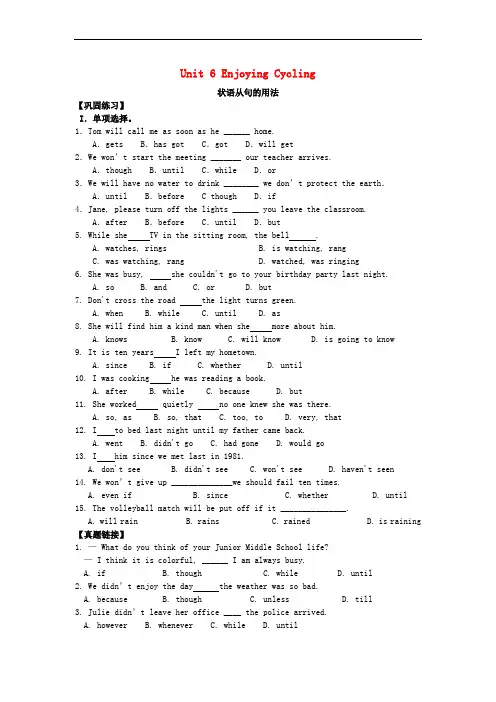
Unit 6 Enjoying Cycling状语从句的用法【巩固练习】I.单项选择。
1.Tom will call me as soon as he ______ home.A.gets B.has got C.got D.will get2.We won’t start the meeting _______ our teacher arrives.A.though B.until C.while D.or3.We will have no water to drink ________ we don’t protect the earth.A.until B.before C though D.if4.Jane, please turn off the lights ______ you leave the classroom.A.after B.before C.until D.but5. While she TV in the sitting room, the bell .A. watches, ringsB. is watching, rangC. was watching, rangD. watched, was ringing6. She was busy, she couldn't go to your birthday party last night.A. soB. andC. orD. but7. Don't cross the road the light turns green.A. whenB. whileC. untilD. as8. She will find him a kind man when she more about him.A. knowsB. knowC. will knowD. is going to know9. It is ten years I left my hometown.A. sinceB. ifC. whetherD. until10. I was cooking he was reading a book.A. afterB. whileC. becauseD. but11. She worked quietly no one knew she was there.A. so, asB. so, thatC. too, toD. very, that12. I to bed last night until my father came back.A. wentB. didn't goC. had goneD. would go13. I him since we met last in 1981.A. don't seeB. didn't seeC. won't seeD. haven't seen14. We won’t give up ______________we should fail ten times.A. even ifB. sinceC. whetherD. until15. The volleyball match will be put off if it _______________.A. will rainB. rainsC. rainedD. is raining 【真题链接】1. — What do you think of your Junior Middle School life?— I think it is colorful, ______ I am always busy.A. ifB. thoughC. whileD. until2. We didn’t enjoy the day the weather was so bad.A. becauseB. thoughC. unlessD. till3. Julie didn’t leave her office ____ the police arrived.A. howeverB. wheneverC. whileD. untilII.根据汉语提示,完成下列句子。
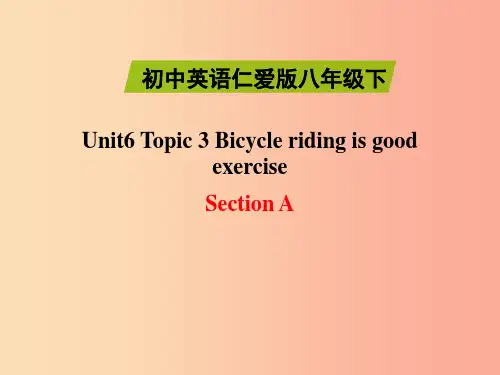
博爱英语 8 年级下 Unit 6 Topic 3 Section A 教案设计一 . 学习目标:1.学习条件状语从句的用法。
2.学习怎样写交通事故的报告。
3.议论骑自行车的利处与不足之处二、自学检测:. 必会主要生词和短语Passenger crazy anywhere impossiblesafe death slow down avoid rush三.自学导学:1让学生疏组检查并议论上学采纳的交通方式。
比如How do you usually go to school? Why do you go to school by/on?2 Then let the students fill out the form.How do you usually go to Why do you ... by ...?How many students ...school?By bikeBy busBy motorbikeOn foot让学生议论骑自行车的长处,达成1b.3 让学生听1a 回答以下问题:①Why does Darren like riding bike?②What should we do to avoid traffic accidents?4 ( 学生阅读对话并找出实用的短语或句子)⑴ get used to traffic accident save energy slow downbe afraid of be hurt cause air pollution rush to sb⑵If people obey the traffic rules, there will be fewer accidents.It ’s easy to park bikes, too.专心爱心专心 11 / 3To avoid hitting the truck.( 学生三人一组分角色朗诵对话,。
Unit6EnjoyingCycling状从句的用法【概念引入】状从句名言:〔1〕状从句Assoonasmanisborn,hebeginstodie.出生之,死亡之始。
Lifeishalfspentbeforeweknowwhatitis.在我知道生活是什么,生活已去一半了。
〔2〕地点状从句Wherethereisgreatlove ,therearealwaysmiracles.哪里有大的,哪里就有奇迹。
〔3〕原因状从句Somepeoplewillneverlearnanything,becausetheyunderstandeverythingtoosoon.有些人不能学到什么西,因,他任何西都懂得太快。
〔4〕条件状从句Ifwintercomes,canspringbefarbehind?冬天来了,春天会?〔5)步状从句Aliarisnotbelievedeventhoughhetellsthetruth.者即使在也没人相信。
2.状从句定:用一个句子(从句)来作另一个句子(主句)的状,用作状的句子就叫作状从句。
作什么的状就叫什么型的状从句。
引状从句的接是附属,状从句可以放在句首,也可以放在句尾。
状从句的型主要有:状从句、地点状从句、原因状从句、果状从句、目的状从句、条件状从句及比状从句等。
【用法解】状从句:状从句在主句中表示,常用接有:when〔当⋯⋯〕,while〔当⋯⋯〕,as〔当⋯⋯〕,before〔在⋯⋯之前〕,after〔在⋯⋯之后〕,since〔自从〕,not⋯until〔直到⋯⋯才〕,assoonas〔一⋯⋯就〕,once〔一旦⋯⋯就〕等。
例如:Ididn ’tgotobeduntilIfinishedmyhom ework我.直到做完作才去睡。
IcanlistentotheradiowhileIwork. 我可以听收音机工作。
状从句中,一般要用一般在代替一般将来,一般去代替去将来。
Unit 6 Enjoying Cycling状语从句的用法【巩固练习】I.单项选择。
1.Tom will call me as soon as he ______ home.A.gets B.has got C.got D.will get2.We won’t start the meeting _______ our teacher arrives.A.though B.until C.while D.or3.We will have no water to drink ________ we don’t protect the earth.A.until B.before C though D.if4.Jane, please turn off the lights ______ you leave the classroom.A.after B.before C.until D.but5. While she TV in the sitting room, the bell .A. watches, ringsB. is watching, rangC. was watching, rangD. watched, was ringing6. She was busy, she couldn't go to your birthday party last night.A. soB. andC. orD. but7. Don't cross the road the light turns green.A. whenB. whileC. untilD. as8. She will find him a kind man when she more about him.A. knowsB. knowC. will knowD. is going to know9. It is ten years I left my hometown.A. sinceB. ifC. whetherD. until10. I was cooking he was reading a book.A. afterB. whileC. becauseD. but11. She worked quietly no one knew she was there.A. so, asB. so, thatC. too, toD. very, that12. I to bed last night until my father came back.A. wentB. didn't goC. had goneD. would go13. I him since we met last in 1981.A. don't seeB. didn't seeC. won't seeD. haven't seen14. We won’t give up ______________we should fail ten times.A. even ifB. sinceC. whetherD. until15. The volleyball match will be put off if it _______________.A. will rainB. rainsC. rainedD. is raining 【真题链接】1. — What do you think of your Junior Middle School life?— I think it is colorful, ______ I am always busy.A. ifB. thoughC. whileD. until2. We didn’t enjoy the day the weather was so bad.A. becauseB. thoughC. unlessD. till3. Julie didn’t leave her office ____ the police arrived.A. howeverB. wheneverC. whileD. untilII.根据汉语提示,完成下列句子。
1. 虽然他贫穷,但至少他诚实。
_______he is poor, he is _______honest.2.即使明天天气不好,约翰还想去。
_______ the weather is bad tomorrow, John __________ go.3. 不要要我解释,除非你真得不懂。
Don’t ask me _____________ you really don't understand.4. 快点!否则你就错过火车了。
Hurry up, _______ you _________the train.5. 自从我1990年搬家到这,就住在这个城市里。
We ________in this city __________ I moved here in 1990.6.你决定当你长大时想干什么了吗?Have you decided ________you want to be _______ you grow up?7. 不要着急,我得到信息就给你打电话。
________, I’ll phone you_________ I get the news.8. 昨天直到警察来,那个醉汉才离开车站。
The drunk man _______the station _______ the police came yesterday.【答案与解析】I.单项选择。
1. A。
句意为“Tom一到家就会给我打电话的”。
本题考查时问状语从句。
主句为一般将来时,as soon as引导的是时间状语从句要用一般现在时,故答案为A项。
2. B。
句意为“直到老师到了我们才会开始开会”。
本题考查连词的用法。
not... until... 意为“直到……才……”。
3. D。
句意为“如果我们不保护地球,我们将没有水喝”。
until直到……;before在……之前;though尽管,虽然;if如果。
四个选项中D符合句意。
4. B。
句意为“Jane,离开教室前请关灯”。
after在……之后;before在……之前;until 直到;but但是。
根据句意应选B。
5. C。
本题是由while引导的状语从句,强调的是“正在看电视时,门铃响了”,所以从句用过去进行时,主句用一般过去时。
答案为C。
6. A。
前面一句是说明理由“她很忙”,才产生后面的结果“不能参加你的生日晚会。
”答案是A。
7. C。
如果主句用否定形式,从句用肯定形式,表示“直到……才……”,并且主句的谓语动词为非延续行动词(如:leave,start,come,see,go to bed等),表示这一动作直到某时才开始发生,故选择C。
8. A。
在时间、条件状语从句中,用一般现在时表将来意义。
9. A。
在英语里,有一些非延续性的动词,他们只是一瞬间就结束的动作,如:come,go,arrive,reach,see,hear,close,leave,begin,start,lose,buy,fall,join,die,get up等,用It is… since…的句型来表达目前存在的一种状态。
故正确答案为A。
10. B。
由while引导的从句表示某个动作还在进行的同时,另一个动作也在进行之中。
故正确答案为B。
11. B。
so…that…意为“如此……以至于……”,表示结果,故正确答案为B。
12. B。
在not…until…句式中,意为“直到……才……”,句意为“直到爸爸回来,我才上床睡觉”。
13. D。
由since引导的一般过去时从句,可知主句要用现在完成时。
句意为“自从1989年我们最后一次相见,就没有再相见过”。
14. A。
句意为“即使我们失败十次,我们都不会放弃在”。
even if意为“即使”引导让步状语从句。
15. B。
考查if引导的条件状语从句。
如果主句用一般将来时,从句用一般现在时表示将来的意义。
【真题链接】1. B。
句意:—你觉得你的初中生活怎么样?—我觉得丰富多彩,尽管我一直很忙。
if“如果”;though“尽管,虽然”;while“当……时候”;until“直到”。
根据句意可知此处引导让步状语从句,故选B。
2. A。
句意:因为天气太差我们未能尽情享受。
从句表原因,故选A。
though“虽然”;unless“除非”;till“直到”均不符合题意。
3. D。
句意:Julie没有离开她的办公室,直到警察来了。
however“不管怎样”;whenever“无论什么时候”;while“当……时候”;until“直到”。
根据句意选D项。
II.根据汉语提示,完成下列句子。
1. Although / Though;at least2. Even though / Even if, will want to3. to explain unless4. or, will miss5. have lived,since6. what, when7. Don't worry, as soon as8. didn't leave, until。